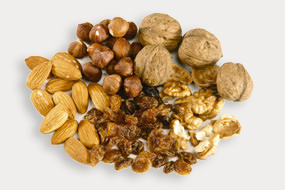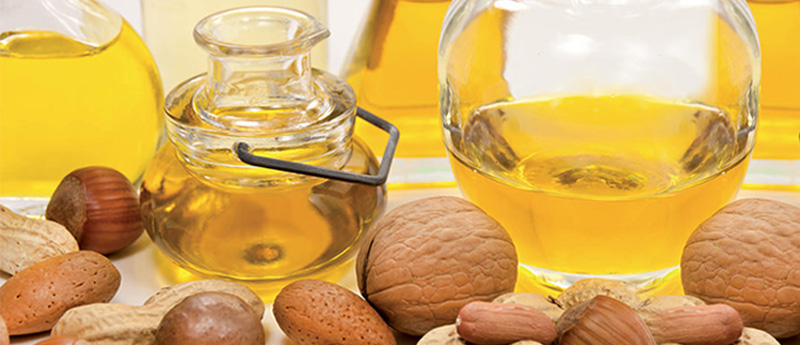Oils that do us good
3 polyunsaturated fatty acids (PUFAs) are considered as indispensible by ANSES, the French agency responsible for food safety:
- linoleic acid = LA, omega-6, high concentrations in a good number of vegetable oils (corn, sunflower, grape seed),
- alpha-linolenic acid = ALA, omega-3 mainly found in certain vegetable oils (walnut, rapeseed, soya, hemp, linseed) and oil seeds (walnut, linseed, almonds),
- docosahexaenoic acid = DHA, omega-3 from fatty fish, also sources of EPA (eicosapentaenoic), its precursor.
The diet of mankind's ancestors was rich in ALA, EPA and DHA and contained little LA and no transfats. Our diet has changed over the past 100 to 200 years, giving rise to so-called civilisation diseases such as allergies, osteo-articular disorders, neuronal diseases etc.
Although levels of LA appear to be well covered in the Western diet, levels of ALA and EPA/DHA are significantly below recommendations.
These fatty acids are notably required:
- for the fluidity of cellular membranes, of vital importance for example for the immune cells and for the nerve cells and mucous membranes,
- to combat inflammation: recent studies have discovered that polyunsaturated fatty acids, especially EPA and DHA, are the precursors of molecules vital to combat inflammation and the tissue repair process.
So it is of no surprise that numerous studies demonstrate the beneficial effects of polyunsaturated fatty acids on:
- osteo-articular discomfort,
- hormonal imbalance,
- memory problems, stress,
- allergic areas,
- skin disorders.
Pretty flowers make beautiful skin
 With borrage and linseed oil, evening primrose oil has one of the highest level of gamma-linoleic fatty acids (GLA), an omega-6 and valuable fatty acid recognised for its virtues in terms of skin health (synthesis and maintenance of epidermal cells) as well as for feminine comfort: premenstrual syndrome, menopause and pre-menopause.
With borrage and linseed oil, evening primrose oil has one of the highest level of gamma-linoleic fatty acids (GLA), an omega-6 and valuable fatty acid recognised for its virtues in terms of skin health (synthesis and maintenance of epidermal cells) as well as for feminine comfort: premenstrual syndrome, menopause and pre-menopause.
Incorporating fatty acids within your meals
Limit the consumption of foods rich in:
- Processed transfats: pastries, pizzas, margarines, sauces…
- Saturated fatty acids: animal fats, butter, deli food, palm oil…
Most of these foods are generally high in cholesterol.
Favour foods rich in polyunsaturated fatty acids:

- Small fatty fish such as sardines, mackerel, herring, anchovies, etc. at least twice a week,
- Virgin first cold-press oils: experiment with flavours by alternating or mixing walnut, rapeseed and olive oil in your dressings (at least 2 soup spoonfuls per day),
- Don't forget walnuts, almonds, hazelnuts and pine nuts as a snack (one handful each day).
Yes to intelligent seeding!
Experts have shown that a handful of oil seeds (walnut, hazelnut, almonds, etc.) per day is enough to gain multiple health benefits:
 neurone, memory protection…
neurone, memory protection…- cardiac and vascular protection (blood flow, softening of the artery walls, fewer rhythmic disorders, etc.),
- sharpness of eyesight,
- fertility.
Avoid salted, sweetened or covered seeds and favour organic products as irradiation is frequently carried out by producers and causes significant vitamin degradation.
Focus on the quality criteria of oils
Virgin first cold-press oils are obtained by solely physical and mechanical means. This ensures the absence of chemical solvents and of contaminants associated with de-odorisation and decoloration. These oils are also free of oxidated by-products produced through heating and provide an optimum content of vitamins and plant antioxidants (carotenoids, tocopherols, pigments) with beneficial health effects.
So keep an eye on the labels!
You should also favour uncooked oils (as part of a vinaigrette, for example) in order to avoid the formation of oxidation by-products or transfats.
For cooking, favour olive oil, which is much less sensitive to heat!

 With borrage and linseed oil, evening primrose oil has one of the highest level of gamma-linoleic fatty acids (GLA), an omega-6 and valuable fatty acid recognised for its virtues in terms of skin health (synthesis and maintenance of epidermal cells) as well as for feminine comfort: premenstrual syndrome, menopause and pre-menopause.
With borrage and linseed oil, evening primrose oil has one of the highest level of gamma-linoleic fatty acids (GLA), an omega-6 and valuable fatty acid recognised for its virtues in terms of skin health (synthesis and maintenance of epidermal cells) as well as for feminine comfort: premenstrual syndrome, menopause and pre-menopause.
 neurone, memory protection…
neurone, memory protection…